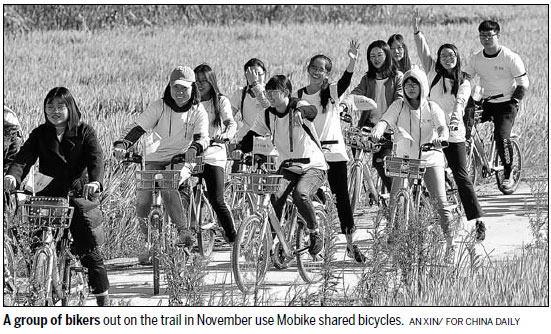Bike groups, others, gear up for more disputes in sharing economy
The development of the sharing economy increasingly depends on intellectual property - including patents, trademarks and copyright - rather than just financial capital.
That's according to industry insiders at the recent Global Intellectual Property Ecology Congress in Beijing.
Liang Jian, IP supervisor of Chinese leading shared bicycle operator Mobike, said at the forum that over the last few years patent lawsuits had emerged in sectors of the sharing economy.
"Patents have become a necessary weapon for competitors to compete and defend themselves," he said.
"In the future, there will be a new pattern of competition in the sharing economy, and patent owners in traditional businesses will enter the sector with their patents."
Mobike has filed about 60 domestic and international patent applications, and has been granted more than 20 patents. It also has applied for more than 180 trademarks, and its major competitor Ofo has applied for more than 500 trademarks.
Liang said companies needed a well-established IP management system when involved in lawsuits, and called for improved incentive systems for inventors to cultivate the culture of innovation.
"The increasingly frequent news reports on IP disputes will improve companies' awareness," he added.
Yuan Bingsong, CEO of Laidian Technology, one of the earliest and biggest power bank rental service providers, said that currently there are far fewer patents from companies involved in the sharing economy than from other technically innovative companies.
He added that international companies were paying more attention to filing patent applications to get protection than domestic ones.
In the power bank rental business, which has attracted total investment of more than 1 billion yuan ($152.7 million), 45 IP-related lawsuits had been instigated.
"In the sharing economy sector, a company sues its competitor for rights violations, not to win compensation, but to stop infringements so that the competitor can no longer produce and sell the product," Yuan said.
Although companies in the emerging sharing economy are favored by investors, their market expansion will be seriously impacted when they are involved in infringements, said Liu Yuanju, a researcher at Shanghai Institute of Finance and Law.
If a firm does not have its own IP rights, the most immediate hurdle it faces is the evaluation of the company when it tries to get listed or be sold, Liu said.
Laidian Technology's Yuan said a company must, first of all, realize the importance of IP.
"Then, it must seek the elements that can help to increase its market competence, such as core patents," Yuan said, adding that core IP rights were increasingly showing their value in market competition, and becoming a decisive element of success.
zhangzhao@chinadaily.com.cn

(China Daily 12/14/2017 page17)














